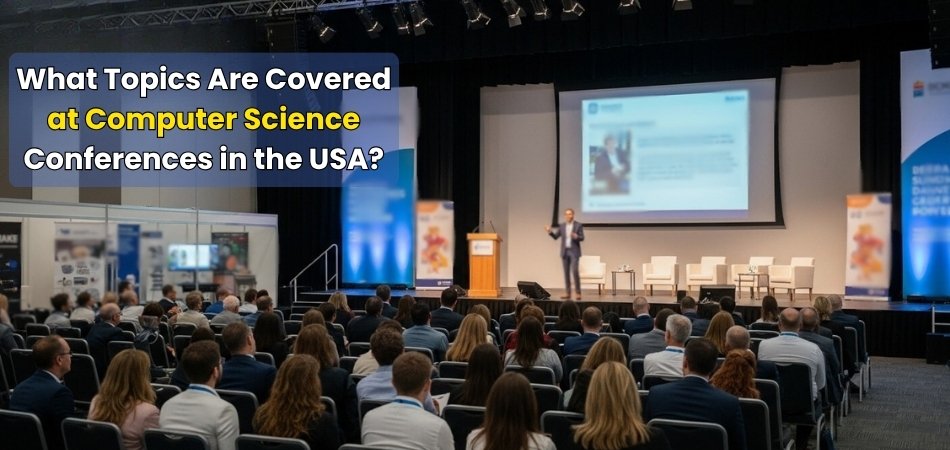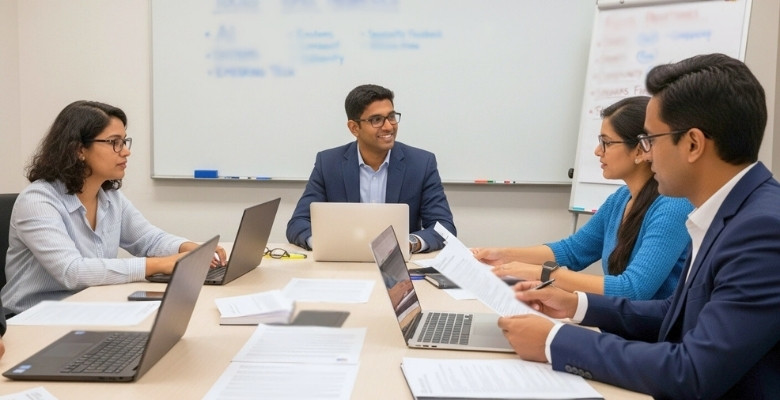Computer science conferences in the USA draw people who love tech and want to learn about what’s new. These events are filled with sessions, demos, and talks that cover both common and advanced topics. Because of this, many people who want to attend these events often wonder what topics are covered at computer science conferences in the USA.
Computer science conferences in the USA cover a wide range of topics, including artificial intelligence, cybersecurity, big data, cloud systems, and software development. Other common subjects are computer vision, networking, high-performance computing, and mixed reality. These topics are shared through live talks, workshops, and hands-on demos. Every topic shows how computer science is used in real life.
Check out this article if you’re curious about what happens at these events or want to know what topics you might enjoy most. This section explains all the important topics so you know what you can expect and what you might like to explore.
What Topics Are Covered at Computer Science Conferences in the USA?
Computer science conferences in the USA bring together people who enjoy learning, building, and sharing tech ideas. These events cover many interesting topics from different parts of the tech world. You’ll find sessions, talks, and workshops on things you may have heard about—and some you haven’t. Keep reading to see what exciting topics you can explore at these conferences.
Artificial Intelligence & Machine Learning
This topic focuses on how computers learn from data and make decisions without being directly told what to do. At conferences, you’ll hear about smart machines, chatbots, and how AI is used in everyday tools. You may also see real examples of how machine learning works. It’s one of the most popular subjects and keeps growing every year. People love learning how machines can think and improve.
Cybersecurity & Data Privacy
Keeping our personal and online information safe from hackers and threats is the focus of this article. Experts talk about new ways to keep data safe and how to stop cyberattacks. You’ll also learn why strong passwords and secure websites matter so much. These sessions often include real stories of data being stolen and how it was stopped. It’s a very important topic in today’s tech world.
Big Data & Data Analytics
Big data means working with huge amounts of information that can’t be handled by regular tools. At conferences in USA, you’ll learn how experts collect, sort, and study this data. Data analytics helps people find patterns and make smart decisions based on the numbers. It’s used in everything from business to sports to healthcare. This topic is great for those who enjoy working with facts and numbers.
Quantum Computing
Quantum computing sounds complex, but it’s all about super-fast computers that work differently than normal ones. These computers can solve problems much faster using special particles. At conferences, you’ll see how this new tech could change the future. It’s still being developed, but it’s very exciting. People love hearing about what might be possible soon.
Cloud Computing & Distributed Systems
Cloud computing means storing and using data on the internet instead of just on your device. It lets people work together from anywhere and access files anytime. Distributed systems help big companies run their apps smoothly across many locations. These sessions explain how all this works behind the scenes. If you use apps or online tools, this topic connects to your everyday life.
Software Engineering & Systems
Software engineering is about designing and building apps, programs, and systems that people use every day. You’ll hear how developers plan, write, and test their code. Systems also include the tools that help software work better and faster. These talks are perfect if you’re curious about how apps are made and improved. It’s a very hands-on and creative part of computer science.
Computer Vision & Pattern Recognition
This topic is about helping computers understand images, faces, and objects—kind of like giving them eyes. Pattern recognition helps machines spot shapes, colors, or movement. At conferences, people show how this tech is used in cameras, robots, and even cars. It’s cool to see how machines can “see” things like we do. You’ll often see fun demos during these sessions.
Networking & Communications
Networking means how computers, phones, and devices connect and talk to each other. It’s the reason you can send messages, use Wi-Fi, and stream videos. Experts at conferences explain how networks are built, fixed, and improved. They also talk about faster internet and new ways to connect more devices. It’s a topic that keeps getting better with new tech.
Human-Computer Interaction & Mixed Reality
People use computers in smart and easy ways in this article. It also includes virtual reality and augmented reality, which mix the real world with computer graphics. At conferences, you’ll see cool gadgets, games, and tools that use this tech. People study how users feel while using these devices. It’s a fun and creative part of computer science.
High-Performance & Parallel Computing
This topic covers super-powerful computers that solve hard problems very quickly. Parallel computing means using many computers or parts of one to work at the same time. It helps scientists, engineers, and researchers do things faster and smarter. These systems are used in weather prediction, space, and science labs. It’s all about doing more work in less time.
Do Seasonally Held USA-based Computer Science Conferences Focus on Different Topics?
Different times of the year can affect what topics are talked about at computer science conferences in the USA. In spring, many conferences focus on new ideas and early research, since it matches the start of academic cycles. Summer often features industry events with practical tools and new product demos. Fall brings big events that mix advanced research with new software updates from tech companies.
Winter conferences are usually smaller, with deeper topics or hands-on workshops that let people focus more closely on one area. Some winter events highlight niche tech like quantum computing or security, which grow in interest during this time. Academic breaks also allow more students and teachers to attend and present. These seasonal shifts help shape the kind of talks and sessions offered.
If you’re interested in specific fields like machine learning or data science, the best time of year to attend computer science conferences in the USA might depend on when those topics are usually featured. Planning around these cycles helps you choose an event that matches what you want to learn. Some subjects show up more in certain months due to tech launches or academic deadlines. Picking the right season means you’ll get the most from your time at the event.
How Are Topics Chosen for Each Computer Science Conference in the USA?
Every computer science conference in the USA has its own theme or focus, and the topics are not picked randomly. There is always a plan behind the subjects that appear in the talks, panels, and workshops. Many people work together to decide what should be included. Here’s how topics are selected and why they matter.
Based on Event Theme
Each conference usually has a main theme, like artificial intelligence, software systems, or cybersecurity. The theme helps decide what topics fit best for that year. Organizers want all sessions to connect in some way. This helps attendees learn more from a focused group of topics. A clear theme makes the whole event easier to follow.
Review of New Trends
Organizers often look at what’s new and popular in the tech world. If a lot of people are talking about a subject, it might become a topic. This could include things like new tools, updates, or big changes in technology. Staying current keeps the event exciting and useful. People enjoy learning about what’s happening right now.
Speaker Submissions
Many conferences let speakers suggest their own topics by sending in ideas. These are called submissions, and organizers read through them all. The best ones are picked based on interest and usefulness. This way, the event includes real-world ideas from different people. It also brings fresh and creative sessions every year.
Community Feedback
After each conference, organizers often ask attendees what they liked and what they want next time. This feedback helps shape future topics. If many people ask for a subject, it’s more likely to be added. Listening to the crowd keeps the event interesting for everyone. It also shows that the event cares about its audience.
Fit for the Audience
Some conferences are for beginners, while others are made for experts. Topics are chosen to match the skill level of the people attending. The goal is to make sure everyone can follow along and enjoy the sessions. Picking the right level keeps people interested and learning. This is why knowing the audience matters.
Can Attendees Choose Multiple Topics in One Computer Science Conference?
Yes, attendees can choose multiple topics in one computer science conference event if the schedule allows and the sessions do not overlap. Most conferences offer many sessions across different subjects, running at different times or in separate rooms. This gives people the freedom to pick what interests them most without feeling stuck. Choosing from multiple topics helps make the whole event more exciting and useful.
Some conferences offer tracks that group sessions by topic, like software, AI, or cybersecurity, which helps with easy selection. You can follow one track or mix and match depending on what you want to learn. These tracks help guide you through the event without missing important sessions. Organizers usually give a schedule early, so attendees can plan ahead.
It’s a good idea to check the full agenda before the event starts and make a simple plan for each day. Picking sessions from different topics keeps things fresh and helps you explore more than one area. If two sessions happen at the same time, some may be recorded for later viewing. Having options means you learn more and enjoy the conference your way.
How Can Attendees Pick a U.S.-Based Computer Science Conference Covering Multiple Topics?
Not every computer science conference is the same, and some focus on just one subject while others cover many areas at once. If you’re looking to learn about more than one topic, it’s important to know how to spot the right event. Picking the best one means checking more than just the title or place. Here are some tips to help you make a good decision.
Check the Event Theme
Every conference has a main theme that sets the focus, but some events include many topics under one theme. These kinds of events offer variety through different tracks or sessions happening at the same time. You can learn about machine learning, cybersecurity, and software in one place. A wide theme often means more options and a chance to explore more interests. Always read the event’s full description to see what topics are included.
Read the Full Schedule
Looking through the schedule gives you a clear idea of what the conference covers. Each day is usually filled with sessions in different rooms or time slots. This lets you switch topics and plan your day around what sounds most interesting. If the schedule shows a good mix of topics, that’s a great sign. Take note of what’s repeated across days—it shows what the event focuses on the most.
Explore Session Types
Most multi-topic conferences offer more than just talks. They might have workshops, demos, or panel discussions, each covering different areas of computer science. These extra formats give you more ways to learn and explore topics. You might attend a coding workshop for one hour and listen to a data science talk the next. A mix of session types usually means more topic variety and better learning.
Look at the Speaker List
Events with many speakers from different backgrounds usually cover more topics. If the list includes experts in AI, software, data, and more, the event likely has wide coverage. Reading speaker bios gives you a hint about what they’ll talk about. A well-rounded speaker list helps you know what to expect. It’s a smart way to check if multiple areas will be included.
Use Trusted Platforms
People often don’t know where to start when looking for multi-topic conferences. When comparing different events, starting with trusted platforms for finding computer science conferences in the USA can save time and show more topic variety. These platforms usually include schedules, speaker lists, and other details. It’s a simple way to find the events that match what you’re looking for. You won’t have to visit many websites one by one.
Compare Past Editions
Most conferences run every year, and you can look at their past versions online. Check what topics were covered in the last event and if it had a good mix. If it included different sessions and speakers before, it’s likely to do the same again. You can also read reviews to see if people enjoyed the range of topics. Looking at past events helps you make a better choice.
Tips to Utilize the Knowledge You Gain From Attending a Computer Science Conference
Attending a computer science conference can teach you a lot of useful things. But learning is just the first step—it’s what you do next that matters. Here are some simple and smart tips to help you use that knowledge well.
- Review Your Notes: Go through your notes while the ideas are still fresh in your mind. Highlight important points and write quick thoughts beside them.
- Practice What You Learned: Try using one or two new tools or techniques you saw at the event. Doing it yourself helps you remember it better.
- Share With Others: Talk to friends or coworkers about what you learned at the conference. Teaching others helps you understand the topic more clearly.
- Follow Up With Speakers: Send a short thank-you message or a question to any speaker you liked. You might start a useful conversation or get more tips.
- Update Your Projects: Look at your current coding projects and think about what ideas from the event could improve them. Start with small changes first.
- Join Online Groups: Many events have online groups where people keep sharing ideas. Stay active there and keep learning even after the event ends.
- Organize Your Resources: Sort out the links, tools, or files you got from the event. Put them somewhere safe and easy to find later.
- Set Simple Goals: Pick one thing to apply each week from what you learned. Small steps help you turn new knowledge into real skills.
Frequently Asked Questions
Computer science conferences offer more than just talks on well-known subjects. They often include smaller topics, hands-on areas, and hidden gems that don’t always get attention. If you’re still curious about what else you might find at these events, these FAQs will help you explore even more topic-related details.
What Types of Tools Are Introduced at Computer Science Conferences in the USA?
Computer Science Conferences in the USA often introduce the latest tools used in software development, data analysis, machine learning, and testing. Many sessions include live demos, giving attendees a chance to see how these tools work in real projects. Some tools are open-source, while others are used by large companies. This helps people stay up to date with what’s trending in tech.
How Are Topics Divided During the Computer Science Conferences in the USA?
Topics at Computer Science Conferences in the USA are usually divided into tracks based on fields like AI, cybersecurity, data science, and more. Each track includes talks and sessions that go deeper into that subject. This makes it easier for attendees to follow their interests. Some conferences even let you mix tracks and build your own schedule.
How Are Workshops Different From Regular Talks?
Workshops are usually hands-on and interactive, letting you try tools or build simple projects. Regular talks are more about listening and learning from experts. Workshops give you direct experience with a topic. They’re great for learning by doing, especially for coding or software tools.
Which Programming Languages Are Commonly Discussed at Computer Science Conferences?
Popular programming languages like Python, JavaScript, and C++ often come up in coding sessions. Talks may compare languages or show how to use them in real projects. Some conferences focus more on beginner-friendly languages. You’ll often find practical demos to help you understand each one better.
How Deep Are the Topics Covered?
It depends on the session. Some talks are light and easy to follow, while others go deep into technical details. Many conferences offer beginner, intermediate, and advanced tracks. This way, everyone finds a session that fits their level.
How Do Conferences Include Space or Science Tech?
Some events cover space data, satellite tools, or research software used by scientists. These topics are super interesting if you like space or labs. Talks may include examples from NASA or research centers. It’s science and tech working together.
What Topics Support Beginners?
Beginner tracks usually include basic coding, easy software tools, and simple project building. These sessions avoid hard terms and focus on clear steps. Great for people who are just starting in tech. You’ll feel welcomed and not overwhelmed.
Last Words
Computer science conferences in the USA are more than just talks and slides—they’re full of exciting topics, hands-on sessions, and real learning moments. Whether you enjoy building apps, exploring data, or testing new tech, there’s always something that sparks interest.
What makes these events special is the variety they offer. From smart machines and cloud systems to virtual reality and cybersecurity, the subjects are fresh, useful, and easy to enjoy. You don’t need to know everything—just be curious and open to learning.
So, if you’ve been wondering what topics are covered at computer science conferences in the USA, now you know there’s something for everyone. Explore what interests you, join the fun, and turn new knowledge into something amazing.








